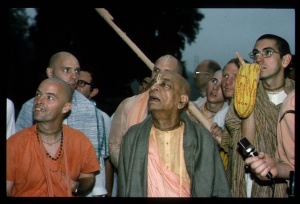CC Antya 17.57 (1975): Difference between revisions
(Vanibot #0027: CCMirror - Mirror CC's 1996 edition to form a basis for 1975) |
(Vanibot #0020: VersionCompareLinker - added a link to the Version Compare feature) |
||
| Line 2: | Line 2: | ||
<div style="float:left">'''[[Sri Caitanya-caritamrta (1975)|Śrī Caitanya-caritāmṛta (1975)]] - [[CC Antya (1975)|Antya-līlā]] - [[CC Antya 17 (1975)|Chapter 17: The Bodily Transformations of Lord Śrī Caitanya Mahāprabhu]]'''</div> | <div style="float:left">'''[[Sri Caitanya-caritamrta (1975)|Śrī Caitanya-caritāmṛta (1975)]] - [[CC Antya (1975)|Antya-līlā]] - [[CC Antya 17 (1975)|Chapter 17: The Bodily Transformations of Lord Śrī Caitanya Mahāprabhu]]'''</div> | ||
<div style="float:right">[[File:Go-previous.png|link=CC Antya 17.56 (1975)|Antya-līlā 17.56]] '''[[CC Antya 17.56 (1975)|Antya-līlā 17.56]] - [[CC Antya 17.58 (1975)|Antya-līlā 17.58]]''' [[File:Go-next.png|link=CC Antya 17.58 (1975)|Antya-līlā 17.58]]</div> | <div style="float:right">[[File:Go-previous.png|link=CC Antya 17.56 (1975)|Antya-līlā 17.56]] '''[[CC Antya 17.56 (1975)|Antya-līlā 17.56]] - [[CC Antya 17.58 (1975)|Antya-līlā 17.58]]''' [[File:Go-next.png|link=CC Antya 17.58 (1975)|Antya-līlā 17.58]]</div> | ||
{{CompareVersions|CC|Antya 17.57|CC 1975|CC 1996}} | |||
{{RandomImage}} | {{RandomImage}} | ||
==== TEXT 57 ==== | ==== TEXT 57 ==== | ||
<div class="verse"> | <div class="verse"> | ||
:rādhā-bhāvera svabhāva āna, | :rādhā-bhāvera svabhāva āna, kṛṣṇe karāya 'kāma'-jñāna, | ||
:kāma-jñāne trāsa haila citte | :kāma-jñāne trāsa haila citte | ||
: | :kahe--"ye jagat māre, se paśila antare, | ||
:ei vairī nā deya | :ei vairī nā deya pāsarite" | ||
</div> | </div> | ||
| Line 20: | Line 19: | ||
<div class="synonyms"> | <div class="synonyms"> | ||
rādhā-bhāvera—of the ecstasy of Śrīmatī Rādhārāṇī; | rādhā-bhāvera—of the ecstasy of Śrīmatī Rādhārāṇī; sva-bhāva—characteristic; āna—another; kṛṣṇe—to Kṛṣṇa; karāya—causes Her to do; kāma-jñāna—understanding as Cupid; kāma—as Cupid; jñāne—in the understanding; trāsa—fear; haila—was; citte—in the mind; kahe—She says; ye—the person who; jagat—the whole world; māre—conquers; se—that person; paśila—entered; antare—within My heart; ei vairī—this enemy; nā deya—does not allow; pāsarite—to forget. | ||
</div> | </div> | ||
| Line 27: | Line 26: | ||
<div class="translation"> | <div class="translation"> | ||
Śrīmatī | "Śrīmatī Rādhārāṇī's ecstasy also made Her think of Kṛṣṇa as Cupid, and this understanding frightened Her. She said, 'This Cupid, who has conquered the whole world and entered My heart, is My greatest enemy, for He does not allow Me to forget Him.' | ||
</div> | </div> | ||
Latest revision as of 23:20, 26 January 2020

A.C. Bhaktivedanta Swami Prabhupada
TEXT 57
- rādhā-bhāvera svabhāva āna, kṛṣṇe karāya 'kāma'-jñāna,
- kāma-jñāne trāsa haila citte
- kahe--"ye jagat māre, se paśila antare,
- ei vairī nā deya pāsarite"
SYNONYMS
rādhā-bhāvera—of the ecstasy of Śrīmatī Rādhārāṇī; sva-bhāva—characteristic; āna—another; kṛṣṇe—to Kṛṣṇa; karāya—causes Her to do; kāma-jñāna—understanding as Cupid; kāma—as Cupid; jñāne—in the understanding; trāsa—fear; haila—was; citte—in the mind; kahe—She says; ye—the person who; jagat—the whole world; māre—conquers; se—that person; paśila—entered; antare—within My heart; ei vairī—this enemy; nā deya—does not allow; pāsarite—to forget.
TRANSLATION
"Śrīmatī Rādhārāṇī's ecstasy also made Her think of Kṛṣṇa as Cupid, and this understanding frightened Her. She said, 'This Cupid, who has conquered the whole world and entered My heart, is My greatest enemy, for He does not allow Me to forget Him.'